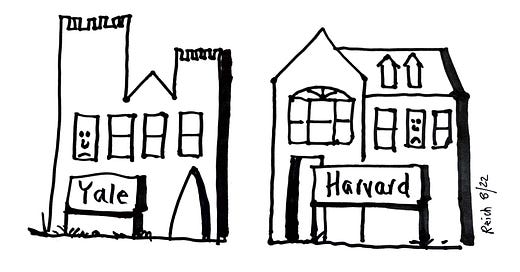The most important thing I teach my students
And why Columbia’s faculty should issue a vote of no confidence in its president, Nemat Shafik
Friends,
The most important thing I teach my students is to seek out people who disagree with them.
That’s because the essence of learning is testing one’s ideas, assumptions, and values. And what better place to test ideas, assumptions, and values than at a university?
Apparently, Columbia University’s president, Nemat Shafik, does not share my view. Last week she prostrated herself before House Republicans, promising that she would discipline professors and students for protesting the ongoing slaughter in Gaza in which some 34,000 people have died, most of them women and children.
The following day she summoned the New York City Police Department to arrest more than 100 students who were engaging in a peaceful protest against it.
Can we be clear about a few things? Protesting this slaughter is not expressing antisemitism. It is not engaging in hate speech. It is not endangering Jewish students. It is doing what should be done on a college campus — taking a stand against a perceived wrong, at least provoking discussion and debate.
Education is all about provocation. Without being provoked — stirred, unsettled, goaded — even young minds can remain stuck in old tracks.
Israel’s war on Hamas is horrifying. The atrocities committed by both sides illustrate the capacities of human beings for inhumanity and show the vile consequences of hate. For these reasons, it presents an opportunity for students to reexamine their preconceptions and learn from one another.
If Columbia, Yale, or any other university now roiled by student protests were doing what it should be doing, it would be a hotbed of discussion and debate about the war. Disagreement would be welcome; demonstrations, accepted; argument, invited; differences, examined and probed.
The mission of a university is to coach students how to learn, not tell them what to think. It is to invite debate, not suppress it. Truth is a process and method — more verb than noun.
I love it when my students take issue with something that I or another student has said, starting with “I disagree!” and then explaining why. Disagreeing is not being disagreeable. Disagreement engenders thought and discussion. It challenges students to reconsider their positions and probe more deeply.
Which is why universities should encourage it. Why they should protect unpopular views. Why they should invite and welcome speakers with views that rile many students. To be riled up is to be attentive, open to new ideas.
And why peaceful demonstrations should be encouraged, not shut down. It is never appropriate to call in armed police to arrest peaceful student demonstrators.
Finally, it’s why universities should go out of their way to tolerate expression that may make some people uncomfortable. To tar all offensive speech “hate speech” and ban it removes a central pillar of education. Of course it’s offensive. It is designed to offend.
There is a limit, of course. Expression that targets specific students, “doxes” them, or otherwise aims to hurt them as individuals doesn’t invite learning. It is a form of intimidation. It should not be allowed.
I’m old enough, and have been a professor long enough, to have seen campuses explode in rage — at bigots like George Wallace when he ran for president, at the horrors of the Vietnam War, at university investments in South Africa, and at efforts to prevent free speech.
Some of these protests were loud. Some caused inconvenience. Some protesters took over university buildings. But most were not violent. Nor did they seek to harm or intimidate individual students.
Whenever university presidents have brought in the police, and students have been arrested and suspended, all learning has stopped.
Which brings me to the central role of university faculties in protecting free expression on campus.
This role is especially critical now, when the jobs of university presidents and trustees have degenerated mainly into fundraising — often from wealthy alumni who have their own myopic views about what sorts of speech should be allowed and what should be barred.
The faculty of Columbia University has every right — and, in my view a duty — to protect peaceful free expression at Columbia with a vote of no confidence in Shafik’s leadership, and seek to end her presidency.
The Columbia faculty along with those of Yale, NYU, and other campuses now engulfed in protests against what is occurring in Gaza should do everything in their power to use the resulting provocations, inconveniences, and discomforts as occasions for learning rather than repression.




I so completely agree with you, Dr. Reich. It is in engaging with others who have different opinions or work from a different set of facts that not only do we have the greatest impact, but ourselves engage in the greatest growth. Certainly, universities and colleges should encourage such dialogues.
Hear! Hear!
This is all part of the right-wing agenda to turn universities into glorified community colleges designed to turn out identical, well-indoctrinated, unthinking replaceable human robots who will do what they're told and, of course, vote GQP (as long as voting is still permitted).